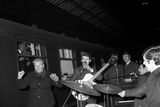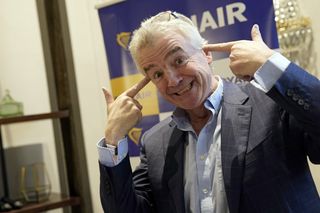Rock: The most famous bootleg of all time
Secret Sessions: It's thought that Bob Dylan 'sat out' most of 1967, but behind the scenes he was experiencing a creative revival.
Never let it be said in the course of his career that Bob Dylan wasn't a man to leave people guessing.
Even now, his career is taking ever-more curious career bends, not least with his forthcoming album release Shadows In The Night - an album set to consist entirely of Frank Sinatra covers.
"Dylan was more or less the polar opposite of Frank Sinatra," notes Michael Gray, author of several Dylan titles including The Bob Dylan Encyclopaedia. "Sinatra was the voice of complacent '50s America, where people went to clubs and congratulated themselves on their sophistications. Bob, meanwhile, was useful and raw and real."
Dylan has long been deft at striking a divine balance between tradition and innovation, and the recent re-release of 1967's Basement Tapes recordings is a deft reminder of this. Weighing in at a hefty 138 songs, The Bootleg Series Vol. 11: The Basement Tapes Complete is a compilation of unreleased home recordings that was pared down to 24 tracks and eventually released by Columbia in 1975.
All told, the re-release may have the subtle whiff of the Christmas market chaser about it (and clocking in at €130 at Tower Records, it could well be a purchase aimed at Dylan completists).
"There's so much on there that's only really of interest to a hardcore fan," notes Gray.
Yet the 1975 release of the Basement Tapes has become venerated and steeped in lore - and deemed 'the most famous bootleg of all time' - and rightly so.
It was recorded in 1966/7 at a significant juncture in Dylan's career. Mired in an exhaustive world tour, the 'voice of a generation' tag was weighing heavily on the 25-year-old.
"Different anachronisms were thrust upon me," Dylan wrote in his 2004 memoir Chronicles. "Legend, Icon, Enigma, stuff like that, but that was all right. Prophet, Messiah, Saviour - those are tough ones."
He'd also made the leap from 'folk hero' to 'electric messiah', much to the apparent chagrin of some fans.
"Notoriously, someone at a concert in Manchester shouted 'Judas' at him, because they felt he'd betrayed folk music and his left-wing political integrity," explains Gray. "On that tour he was utterly magical, but he was also very close to some kind of edge. He said afterwards he'd been taking drugs just to keep himself going."
Burned out after nine gruelling months on the road, Dylan went for a motorcycle ride in July of 1966, and crashed, resulting in a cracked vertebrae and a mild concussion. Only a few months previously, his good friend Richard Farina had died in a bike accident.
Biographer Clinton Heylin wrote in 1990 on the significance of the crash: "Dylan's motorcycle accident is still viewed as the pivot of his career. As a sudden, abrupt moment when his wheel really did explode. The great irony is that 1967 - the year after the accident - remains his most prolific year as a songwriter."
Notes Gray: "He had many further commitments in his career, and the crash gave him a period of rural tranquility. The Basement Tapes came out of that seclusion."
The release is significant in another way; it would mark the beginning of a fruitful collaboration between Dylan and a little-known Canadian band - his backing band on the 1966 US tour - called The Hawks, who would later become The Band.
"If you listen to the live stuff from 1966, when the Hawks and Dylan had been playing for less than a year together, you can hear just what they could do together," Gray says. "It's immensely rich - you can hear each individual musician being creative."
Though the album wouldn't be released for several years, fans now know it as the halfway house between 1966's Blonde On Blonde and 1967's album John Wesley Harding.
"John Wesley Harding was so stripped down and pared back," says Gray. "It really was the most astonishing contrast to the warm, expansive and rich creativity of Blonde On Blonde."
While Dylan continues to tour the world with almost metronomic regularity ("you can hardly get away from him," admits Gray), a new supergroup has taken it upon themselves to showcase the Basement Tapes album. No doubt Dylan purists were bemused to see the band - comprised of Elvis Costello, Mumford & Sons' Marcus Mumford and My Morning Jacket's Jim James - appear on the Ellen Show singing the rollicking 'Kansas City'.
Which if course begs the question: does Dylan, the ultimate dad rocker, have anything to say to younger music fans? And, more to the point, are they listening? "Dylan's early work still draws people in wave after generational wave," affirms Gray.
"Generally, it's the politics, the poetics of the work he did that draws younger fans in. People have said that Dylan could never sing; these days, they're halfway to having a scintilla of a point because his voice is pretty much shot. But when they speak that way of the Dylan of old… well, they just weren't listening."
The Bootleg Series Vol. 11: The Basement Tapes Complete is out now.
Join the Irish Independent WhatsApp channel
Stay up to date with all the latest news














